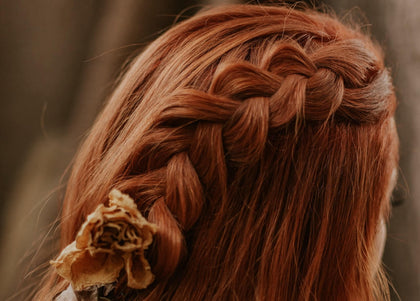Thick hair, like fine and medium hair, requires its own specific hair care routine. And if you have thick hair, you know it can be hard to find the right hair care products that help create shiny, luxurious hair without making it impossible to hold a style.
To help, VEGAMOUR spoke with the experts about how to properly care for this hair texture — plus, what products you really should be using to bring out the best in your thick hair.
#include-related-slider#
Do You Have Thick Hair?
Thick hair refers to the texture of your hair, which is the thickness of your individual hair strands. Your hair texture can be fine, medium or thick (sometimes called coarse). It's important to note that hair texture is different from hair density which refers to the amount of hair you have on your scalp per square inch.
If you have thick hair, each individual hair strand is thick or has a wiry, coarse texture. If you hold up one of your hairs to the light and roll it between your fingers, the hair has a very present feel and looks thick in the light. If the hair feels particularly rough and is harder to bend, it is thick and more on the coarse hair side. You can also have thick hair strands that are more pliable and soft feeling. Because of the nature of the thicker hair strands, thick hair requires more specialized care to keep it soft, pliable, well-hydrated and manageable.
And thick hair can be any hair type – straight hair, wavy hair, curly hair or coily hair. It may also have different conditions such as healthy at the root area, dry in the middle lengths of the strands and more frizzy toward the ends, which can indicate heat damage or damage from chemical treatments like hair coloring services.
The bottom line? Thick strands of hair need special care – from the roots, down the hair shaft, and all the way to the tips, regardless of hair type or the condition of the hair. Here's how to best care for your thick hair.
Specialized Care for Thick Hair
Properly caring for thick hair begins with regular trimming and shaping of the hair to prevent split ends and frizz but also includes what we do each day. Here are some tips for a hair care routine that works to bring out the best qualities in thick hair.
Daily
Daily shampooing and conditioning are not needed for thick hair. But do make sure to brush your hair each day to remove tangles, increase shine and distribute the natural oils throughout your hair strands. This will help your hair to absorb moisture from the natural oils, which is especially important for some hair types like coarse hair or dry hair. Brushing also helps to smooth the hair cuticles and increase shine.
Another benefit of brushing is increased blood flow to the scalp, which is crucial for healthy hair. Only brush your when it's dry, as wet hair is more easily damaged.
Two to Three Times a Week
The products you use to cleanse your thick hair matter. Your favorite VEGAMOUR shampoos and conditioners can help achieve stylable and lustrous hair. Fortified with Karmatin™, a microencapsulated vegan B-silk™ protein, keeps hair looking as smooth as glass.
Once a Week or As Needed
A deep conditioning hair mask can help to restore shine, hydrate your hair, reduce frizz and also repair some of the damage done by heat styling or hair color treatments. An indulgent mask will go right to the areas of your hair strands that need nourishment —smoothing the cuticle and conditioning damaged hair.
Also, consider skipping the blow dryer at least once a week to give your hair a rest. Towel dry until you have damp hair. Then, apply hair oils and/or leave-in conditioning products and detangle strands with a wide-tooth comb. Finally, allow your hair to dry naturally.
Your Guide to Caring for Thick Hair
VEGAMOUR spoke with renowned stylist and Paul Mitchell graduate Shayy Patrese about caring for thick hair. "I always advise my salon clients with thick hair to trim split ends periodically. Split ends of thick hair can make it become thinner and damaged. This can affect the length, shine and volume of the hair. Therefore, we trim off the parts to maintain a healthier mane."
Trim your hair every eight to 10 weeks to reduce the chance of split ends. Your stylist may opt to use thinning shears or other thinning techniques to give your hair more movement and a softer texture.
Your hair stylist can also recommend some great haircut ideas for you, such as a classic or graduated bob. For thick hair, layers can help to reduce the weight of your hair, increase volume, and make it easier to style your hair, but don't go overboard. Too many layers can make thick hair more unruly.
Related: 9 Mistakes to Avoid If You Have Thick Hair
Styling Tips for Thick Hair
Here are some hair care techniques to help tame thick hair into beautiful hairstyles, even for coarse hair textures:
- For coarse hair, use hair mask treatments more often to keep the hair cuticle smooth. Coarse hair tends to be very dry, so keeping hair hydrated will help. Coarse hair, especially, is more manageable when well-hydrated and smoothed.
- A few drops of silicone-free hair oil on the ends can help reduce frizz and soften texture.
- Use heat-protection hair products to reduce damage from heat styling tools as too much heat can damage the hair cuticles.
- Use air drying to help minimize frizzy hair.
- Use the largest barrel of curling iron for the smoothest finished style. For longer hair, sweep your hair into a high ponytail and curl just the ends. Spritz with a little hair spray and allow the curls to cool completely before taking your hair down and shaking the style into place.
- Invest in good hair tools: an ionized hairbrush and hairdryer, a smooth wide-tooth comb and hair ties that won't stress or break your hair.
#include-related-slider#
Release Your Hair's Natural Beauty With VEGAMOUR
Gorgeous hair begins with how you care for your hair at home — and VEGAMOUR's shampoos and conditioners can help you get there. Washing your thick hair is less a chore and more a joy when you know the end result will be more lustrous. Finally, your hair can look and feel its best every day!
More From VEGAMOUR
- Do You Know Your Hair Texture and Hair Type?
- How Often Should You Condition Your Hair?
- How Celebrities Use VEGAMOUR
Photo credit: lucas mendes/Unsplash
Back


















